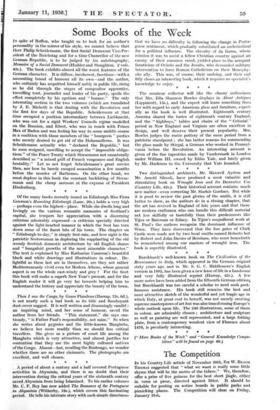Some Books of the Week
IN spite of Billion, who taught us to look for an author's personality in the mirror of his style, we cannot believe that Herr Philip Scheidemann, the first Social Democrat Vice-Pre- sident of the Reichstag and for a time Chancellor of the new German Republic, is to be judged by his autobiography, Memoirs of a Social Democrat (Hodder and Stoughton. 2 vols. 42s.). The book exhibits almost all the worst features of the German character. It is diffuse, incoherent, facetious—with a nauseating brand of humour all its own—and the author, who certainly has acquitted himself nobly in public life, rising as he did through the stages of compositor apprentice, travelling tout, journalist and leader of his party, spoils the effect completely by his egotism and " bounce." The only interesting section in the two volumes (which are translated by J. E. Michell) is that dealing with the Revolution and the first few days of the Republic. Scheidemann at that time occupied a position intermediary between Liebknecht, who was out for a rigid Workers' Councils regime modelled on the Russian, and Ebert, who was in touch with Prince Max of Baden and was feeling his way to some middle course in a coalition with those members of the " bourgeois " parties who merely desired to get rid of the Hohenrollems. It was Scheidemann actually who " declared the Republic," but he soon resigned, unwilling to accept the " impossible obliga- tions " of the Peace Treaty which Stresemann not unnaturally described as " a mixed grill of French vengeance and English brutality." Let us not forget Scheidemann's great service then, nor how he barely escaped assassination a few months before the murder of Rathenau. On the other hand, we must deplore in this book the constant backbiting of Strese- mann and the cheap sarcasm at the expense of President Hindenburg.






































 Previous page
Previous page